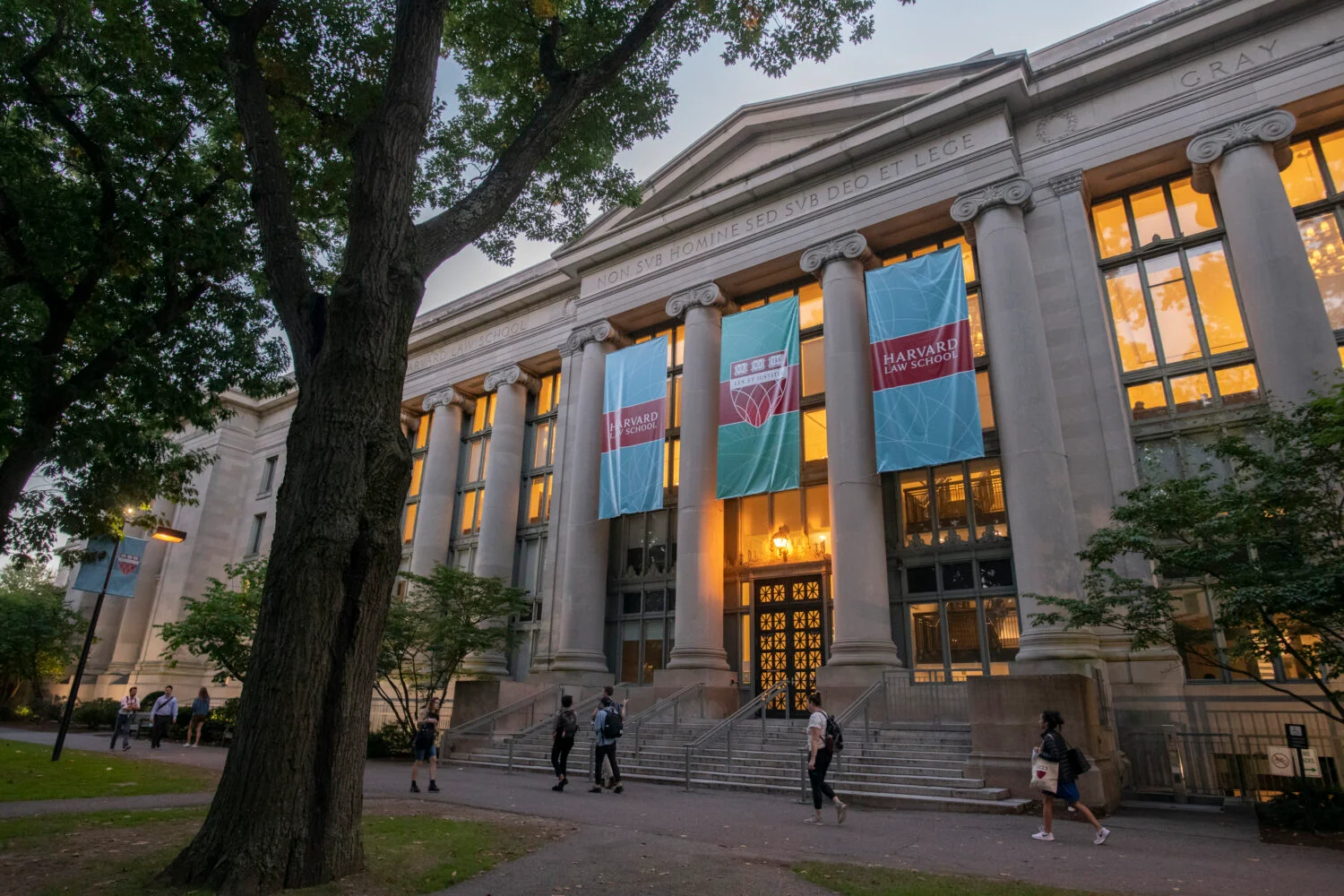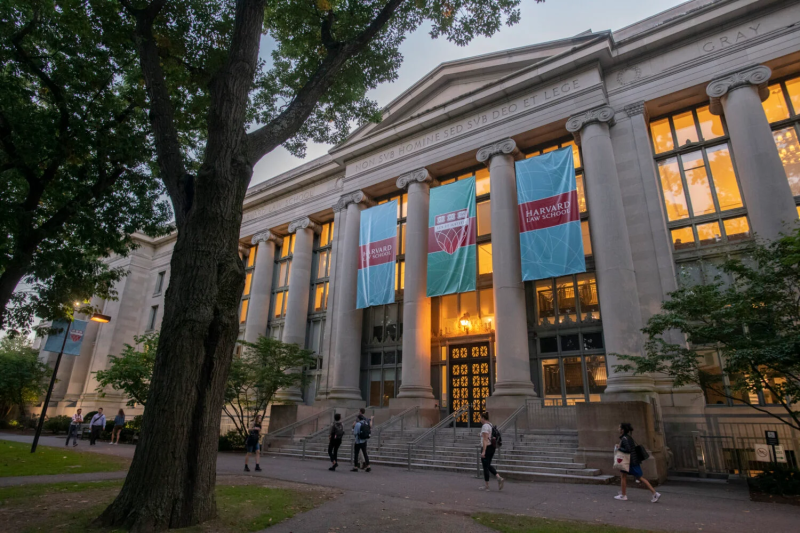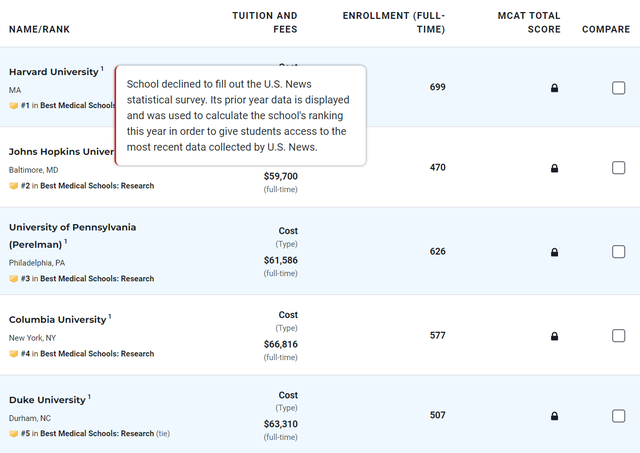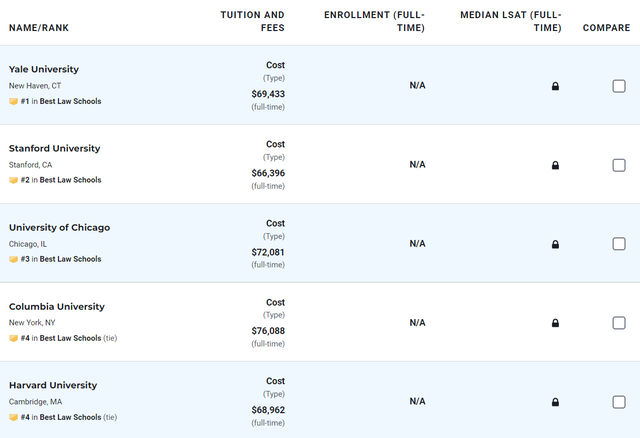
Following the boycott and refusal to provide data by law and medical schools of renowned American universities such as Stanford, Yale, and Harvard due to outdated survey methods, the U.S. News & World Report Rankings (US News) released the annual rankings for these two groups on May 11, three weeks later than planned due to data issues, according to Reuters.
The 2024 Best Law Schools ranking notes unprecedented changes, notably the elimination of the T-14 concept
Notably, the 2024 rankings reveal that several prestigious American schools have “fallen” after maintaining stable positions for many years. For example, Columbia Law School dropped 4 ranks, while UC Berkeley School of Law dropped 1 rank compared to 2023. Remarkably, Harvard Law School fell to 5th place, its lowest position since 1990.
The new US News ranking also eliminates the T-14 concept, which described the 14 law schools that consistently held top rankings for over 30 years. Georgetown University Law Center dropped 1 rank compared to 2023, ceding the 14th position to UC Los Angeles School of Law.
Moreover, 62 other law schools outside the top 14 also saw their ranks increase or decrease by 2 places, a significant fluctuation compared to the previous year’s changes affecting only 27 schools.
Explaining the unprecedented fluctuations, Eric Gertler, CEO of US News, stated on May 10 that the 2024 law school rankings focus on outcome measures. Specifically, the revamped US News ranking method has increased the weight of employment and bar-exam pass rates, while reducing the weight of Law School Admission Test scores and cumulative GPAs.

Simultaneously, the new ranking for medical schools in the research field also employs a new evaluation method, including factors such as faculty resources, academic achievements of admitted students, and research productivity, according to the New York Times.
This method also caused many schools to drop in rank. While Harvard Medical School remained at the top, the 2nd and 3rd positions changed hands. Columbia University’s medical school dropped from 3rd to 4th, and New York University’s medical school fell from 2nd to 10th place.
According to US News, for law and medical schools that refused to provide data for ranking, the organization will use publicly available information to fill in the gaps. A review of the US News website shows that law schools that decided to boycott this ranking are marked with a small number 1 next to the school’s name, indicating that they refused to complete the statistical survey.
For medical school rankings, in addition to noting that the school refused to provide data, US News also states that it will use the previous year’s data to calculate the school’s ranking for this year.

Law and medical schools that refused to participate in the 2024 ranking and did not provide data to US News will have additional notes next to their names
Previously, on April 11, US News released a preview of the rankings for the top law and medical schools. However, due to numerous inquiries and strong reactions from universities, the organization decided to indefinitely postpone the official ranking announcement and removed the preview a few days later.
Amid various controversies surrounding the rankings of American universities, Đào Nhật Mai, CEO of NEEC Study Abroad Consulting Company (Ho Chi Minh City), suggests that global university rankings like US News should only be used as a reference, “not as a mandatory guide” for parents and students choosing schools.
“In general, rankings only hold value at a specific time and do not reflect the long-term quality of the educational institution. Moreover, in academia, there are often tactics to boost rankings,” Mai stated.

The director also believes that reputable and high-quality educational institutions will naturally become known. Therefore, to choose a suitable school, she advises students to consider various other sources of information both nationally and internationally, and also to evaluate the school’s program offerings.
“The current trend among most international students is to choose schools based on the ranking of specific programs rather than just the overall ranking of the school. This is because there are universities with lower overall rankings but higher-ranked specific programs,” Mai suggested.
Similarly, Nguyễn Minh Hạnh Đoan (District 7, Ho Chi Minh City), who is preparing to study abroad soon, also views university rankings as helpful in filtering options but only as a reference and a final consideration. Đoan, who has been accepted into several master’s programs in Europe and is waiting for an ideal scholarship offer, mentioned that she selects schools based on four main criteria: location, academic program, cost, and academic environment.

Experts say rankings like US News only serve as a reference in the school selection process – Photo: DUKE UNIVERSITY SCHOOL OF MEDICINE
“Combining this information helps students choose a school that fits their aspirations and financial situation. This is something university rankings like US News or Times Higher Education cannot accurately predict because even if a school has a high ranking, if it doesn’t fit, it must be ruled out. However, if many universities meet the needs simultaneously, the ranking factor helps students make decisions more easily,” Đoan analyzed.
Source: [Thanh Niên](https://thanhnien.vn/tay-chay-bang-xep-hang-dai-hoc-toan-cau-loat-truong-danh-gia-my-rot-dai-185230514095205833.htm)